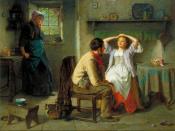Brigitt Artesi
What does Othello tell us about jealousy?
Propelled by intense jealousy, Othello is a representation of green-eyed actions leading to both tragic consequence and the downfall of noble men. The story focuses primarily on the portrayal of jealousy through two major characters: Iago and Othello, showing the corruption of jealousy and the way in which it unmasks our true identity. Othello exposes the way in which jealousy is present in almost everyone and that it can be unleashed by even the slightest arousal.
Shakespeare represents the insecure tendencies of Othello as a weakness to ignite jealousy and that it was these characteristics that propelled his jealousy to a state that not even Iago could have imagined. Othello has become so absorbed by these jealous forces and the idea of Desdemona betraying him for Cassio, that no assurance or explanation can penetrate or change his mind. Seeing Othello in this state allows the reader to see his obsession obscure his mind from any sense of reason, common sense or respect for justice.
Up to the moment of Desdemona's death, Othello's jealousy grew past the point of reason and only when she was killed unjustly, did he recognise her innocence and begin to see his life in proportion. Othello's evolution throughout the story allows the reader to grasp the way in which jealousy will lead us to commit irrational judgements, rash actions and blindly believe words which we are not sure to be true. Only when it is too late may we again begin to collect ourselves and make right judgements as our jealousy leaves when we have destroyed what caused it in the first place.
Shakespeare depicts Othello's jealousy as tunnel visioned but portrays it as a force aiding Iago in obtaining what he wants.


